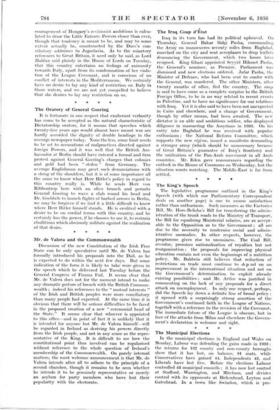The Iraq Coup d'Etat Iraq in its turn has had
its political upheaval. On Thursday, General Bakar Sidgi Pasha, commanding the Army on manoeuvres seventy miles from Baghdad, marched on the city and sent aeroplanes to drop leaflets denouncing the Government, which two hours later resigned. King Ghazi appointed Seyyid Hikmet Pasha, the General's nominee, as Premier. Parliament was dismissed and new elections ordered. Jafar Pasha, the Minister of Defence, who had been sent to confer with the General, was murdered. The other Ministers, after twenty months of office, fled the country. The coup is said to have come as a complete surprise to the British Foreign Office, to be in no way related to recent events in Palestine, and to have no significance for our relations with Iraq. Yet it is also said to have been not unexpected in Cairo and elsewhere, and a change of Government, though by other means, had been awaited. The new dictator is an able and ambitious soldier, who displayed diligence in massacring the Assyrians in 1933. On his entry into Baghdad he was received with popular enthusiasm ; the National Reform Committee, which supports the new re.gime, issued a manifesto demanding a stronger army (which should be unnecessary because of Great Britain's guarantee of Iraq's frontiers) and the unification of the Pan-Arab movement in all Arab countries. Mr. Eden gave reassurances regarding the outlook in the House of Commons on Wedneiday, but the situation wants watching. The Middle-East is far from settled.
*














































 Previous page
Previous page